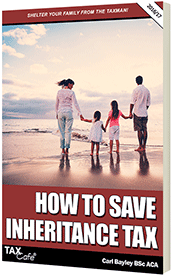Business Property Relief and Inheritance Tax
The latest information can be found in our guide:
How to Save Inheritance Tax whch covers the major changes to business property relief
Thanks to business property relief business owners don’t have to pay any inheritance tax. That’s right, even if your business is worth a billion pounds you don’t have to pay one penny of that to the Government when you die.
Business property relief provides a ‘get out of jail free’ card so that businesses don’t have to be sold or broken up when the owner dies.
The relief provides a useful mechanism to give Inheritance Tax-exempt funds to family and friends
It provides an exemption for ‘business property’. So what is business property? If you own a company your shares are the qualifying property. This means you can leave them to your heirs tax free. If you’re a sole trader the individual assets of the business (including the goodwill) are tax free.
Unfortunately most property investors do not qualify for BPR. Hoping the Government would pass up such easy money is as wishul as zebras hoping lions will become vegetarian.
However, most companies quoted on AIM do qualify. This means anyone who wants to avoid inheritance tax altogether simply has to phone a stockbroker and buy shares in these companies.
Business property relief is, however, complicated and there are many pitfalls awaiting the unwary.
It generally takes just two years for assets to achieve exemption through business property relief, which is considerably better than the seven-year waiting period for potentially exempt transfers.
Sadly, however, it is all too easy to lose business property relief by failing to meet the qualifying conditions at the appropriate time.
There are some particularly nasty pitfalls to watch out for with business property relief. In fact, not only is the relief very easy to lose, but this also has a tendency to happen at just the point in life when Inheritance Tax planning is becoming most important.
There is also the problem that some quite normal commercial structures will leave the business owner with business property relief at just 50% on their most valuable asset when they could so easily have had 100%.
Given the importance of this relief and the comparative ease with which it can be lost, our guide How to Avoid Inheritance Tax takes a long and detailed look at the relevant qualifying conditions. Some of this gets quite technical but is important for anyone wanting to benefit from what is arguably the most powerful way to avoid Inheritance Tax.
For more information about this guide click here:





